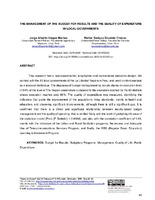The management of the budget for results and the quality of expenditure in local governments
Date
2020-07-01Author
Vargas Merino, Jorge Alberto
Zavaleta Chávez, Walter Enrique
Metadata
Show full item recordAbstract
This research had a non-experimental, longitudinal and correlational predictive design. We worked with the 83 local governments of the La Libertad Region in Peru, and used content analysis as a research technique. The diagnosis of budget management by results shows an execution level of 84% at the level of The Region under study compared to the execution reached by the 83 districts whose execution reaches only 66%. The quality of expenditure was measured, identifying the indicators that guide the improvement of the population's living standards, mainly in health and education, and observing significant improvements, although there is still a significant gap. It is confirmed that there is a direct and significant relationship between results-based budget management and the quality of spending; this is verified firstly with the level of global significance of the statistical model [Prob (F Statistic) = 0.0000], and also with the correlation coefficient of 0.69, mainly with the indicators of the Urban and Rural Sanitation programs, the Access and Adequate Use of Telecommunications Services Program, and finally, the RBS (Regular Basic Education) Learning Achievement Program.
URI
https://hdl.handle.net/20.500.12219/2524https://doi.org/10.36995/j.visiondefuturo.2020.24.02.002.en
https://visiondefuturo.fce.unam.edu.ar/index.php/visiondefuturo/article/view/442/293
Collections
- Revista Visión de Futuro [457]
The following license files are associated with this item:




